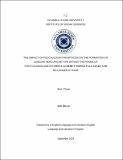DSpace Repository
THE IMPACT OF FOUCAULDIAN PANOPTICON ON THE FORMATION OF JUNGIAN HERO ARCHETYPE WITHIN THE FRAME OF POSTCOLONIALISM IN CHINUA ACHEBE’S THINGS FALL APART AND NO LONGER AT EASE
JavaScript is disabled for your browser. Some features of this site may not work without it.
| dc.contributor.author | İşleyen, Şule
|
|
| dc.date.accessioned | 2020-01-16T12:09:52Z | |
| dc.date.available | 2020-01-16T12:09:52Z | |
| dc.date.issued | 2019-09 | |
| dc.identifier.uri | http://hdl.handle.net/11547/5314 | |
| dc.description.abstract | Evrensel olan kahraman arketipi dünya edebiyatında en çok tekerrür eden karakter arketiplerden biridir. Birbiriyle herhangi bir direkt kültürel iletişimi olmasa da hemen hemen her ulusun kahramanları vardır ve bu kahramanlar onları sıradan insanlardan ayıran bazı ortak özelliklere sahiptir. Bu özellikler insanüstü güç, kararlılık, olağanüstü cesaret, hızla iktidara yükselme ve güçlükle elde edilen zaferler olabilir ancak bunlarla sınırlı değildir. Kahramanların başarmaları gereken zorlu görevler veya üstesinden gelmeleri gereken zorluklar ait oldukları toplumların ihtiyaçlarına göre değişkenlik gösterebilir. Ölümlü olan bu kahramanların bir diğer ortak özelliği de zayıflıklarının olmasıdır. Achebe‘nin Things Fall Apart ve No Longer at Ease adlı eserlerinde Okonkwo ve torunu Obi, bireylerinin tüm ulusun refahı ve gelişimi için sorumluluk üstlenmesini bekleyen toplumlarda dünyaya gelirler ve her ikisinin de başarmaları beklenen bazı görevleri vardır. Toplumun beklentilerini karşılayamama korkusu, her ikisi için de Foucault‘nun Panopticon kuramının vücut bulmuş haline dönüşür ve kahramanların bu görevleri başarıyla tamamlamasında önemli bir rol oynar. Ancak, zorlukların üstesinden gelerek amaçlarına ulaşsalar da, her iki kahraman arketipi de güçlükle elde ettikleri sosyal statülerini kaybetme korkularının üstesinden bir türlü gelemezler. Bu korku, zamanla her iki kahramanın da ortak zayıf noktası haline gelir ve geri dönülmez hatalar yapmalarına sebep olarak kahramanların düşüşlerini de beraberinde getirir. Ancak toplumun bireylerinden başarmalarını beklediği bu görevler, Nijerya‘daki İngiliz sömürgesi öncesi ve sonrasında oldukça farklılık gösterir. Dede ve torun olan iki kahraman, bambaşka amaçlar için mücadele etmektedir. Kahramanların karşılaştıkları zorluklarla başa çıkma ve hedeflerine ulaşma şekilleri de birbirlerinden oldukça farklıdır. Bu sebeple, bu iki eserdeki ana karakterler, Foucault‘nun Panopticon kuramının kahraman arketipine nasıl zemin hazırladığının anlaşılması amacıyla postcolonialism çerçevesinde incelenecektir. | tr_TR |
| dc.language.iso | en | tr_TR |
| dc.publisher | ISTANBUL AYDIN UNIVERSITY INSTITUTE OF SOCIAL SCIENCES | tr_TR |
| dc.subject | Arketipler | tr_TR |
| dc.subject | Kahramanlar | tr_TR |
| dc.subject | Kahraman arketipi | tr_TR |
| dc.subject | Panopticon | tr_TR |
| dc.subject | Postcolonialism | tr_TR |
| dc.subject | Archetypes | tr_TR |
| dc.subject | Heroes | tr_TR |
| dc.subject | Hero archetype | tr_TR |
| dc.subject | Panopticon | tr_TR |
| dc.subject | Postcolonialism | tr_TR |
| dc.title | THE IMPACT OF FOUCAULDIAN PANOPTICON ON THE FORMATION OF JUNGIAN HERO ARCHETYPE WITHIN THE FRAME OF POSTCOLONIALISM IN CHINUA ACHEBE’S THINGS FALL APART AND NO LONGER AT EASE | tr_TR |
| dc.type | Thesis | tr_TR |
| dc.description.abstractol | The hero archetype that is universal is one of the most recurrent character archetypes in the world literature. Almost all nations have their heroes or heroines although they did not have any direct cultural contact with each other, and these heroes and heroines have some characteristics in common. These characteristics might include superhuman strength, determination, and exceptional bravery, rapid rise to power and hard-won triumphs although they are not limited to these. The arduous tasks to accomplish or challenges to overcome may vary depending on the needs of the society the hero or the heroine belongs to. Another common characteristic of these mortal heroes or heroines is their weakness. In Achebe‘s Things Fall Apart and No Longer at Ease, Okonkwo and his grandson Obi are born into societies that expect their members shoulder some certain responsibilities for the betterment and welfare of the whole nation, and thus they have some predetermined tasks to accomplish. Their fear of failing to meet the expectations of their societies becomes a clear embodiment of Foucault‘s notion of Panopticon and plays an influential role in the accomplishment of these challenging tasks. However, although Okonkwo and Obi have overcome challenges and obtained their goals, both hero archetypes cannot get rid of their fear of losing all their hard-won status. This fear becomes a common weakness for both heroes, and it ultimately brings about the heroes‘ downfalls as it causes them to make irretrievable mistakes. Expectations of society and the tasks to be accomplished by Okonkwo and Obi are remarkably different in pre and postcolonial Nigeria, and they strive to accomplish completely different tasks. Additionally, their ways of overcoming the challenges and achieving their goals are dissimilar. Therefore, this study aims at demonstrating how Michel Foucault‘s notion of Panopticon lays the ground for the formation of Carl Gustav Jung‘s archetypal heroes within the frame of postcolonialism‘ in Chinua Achebe‘s Things Fall Apart and No Longer at Ease. | tr_TR |
| dc.publisher.firstpagenumber | 1 | tr_TR |
| dc.publisher.lastpagenumber | 88 | tr_TR |
| dc.identifier.bibliographictag | İşeyen, Şule, THE IMPACT OF FOUCAULDIAN PANOPTICON ON THE FORMATION OF JUNGIAN HERO ARCHETYPE WITHIN THE FRAME OF POSTCOLONIALISM IN CHINUA ACHEBE’S THINGS FALL APART AND NO LONGER AT EASE(2019), ISTANBUL AYDIN UNIVERSITY INSTITUTE OF SOCIAL SCIENCES | tr_TR |
Files in this item
This item appears in the following Collection(s)
-
Tezler -- Thesis [3470]
